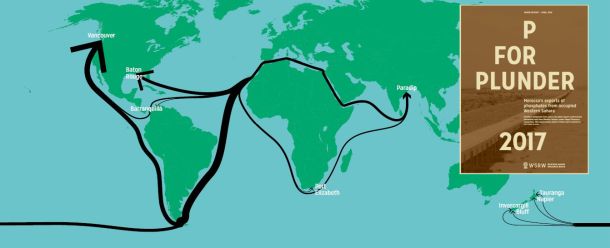On European Maritime Day, Western Sahara Resource Watch (WSRW) demands that the depletion of European fish stocks not be used to justify illegal fisheries practices elsewhere.
A massively subsidized EU fishing fleet has resulted in hopelessly overfished European seas. Although the European Commission is working towards more sustainable fisheries practices, the increasing emphasis on fishing outside EU waters has brought to the fore concerns about operations under the EU’s significant network of bilateral Fisheries Partnership Agreements (FPA).
A particularly controversial fisheries agreement is the FPA between the EU and the Kingdom of Morocco. Relying on the agreement’s vague territorial definitions, the EU allows its vessels to fish in the waters adjacent to Western Sahara - a territory largely occupied by Morocco since 1975 and labelled by the UN as a Non-Self Governing Territory pending the process of decolonization. With Moroccan stocks largely depleted, the bulk of European fishing under the FPA is carried out in Western Saharan waters. In effect, millions of EU taxpayer’s Euros are paid to Morocco for access to fish that does not belong to Morocco.
For over 35 years, Morocco has illegally exploited Western Sahara’s natural resources against the explicit will of the territory’s indigenous population, the Saharawi people. These gains are poured into furthering Morocco’s brutal and illegal military occupation.
Echoing a legal opinion issued by the UN’s Legal Adviser to the Security Council in 2002, a recently published legal opinion by the European Parliament’s legal services concluded that the EU-Morocco FPA is illegal to the extent that it ignores the wishes and interests of the Saharawi people. However, the Saharawi have never given its consent to any element of the agreement, and their democratically elected and internationally recognised government-in-exile, known as the Frente POLISARIO, has repeatedly informed the European Commission that they do not want nor benefit from the agreement.
Despite the unambiguous legal situation, and the egregious human rights violations perpetrated by Morocco in the occupied territory, the EU Commission continues to turn a blind eye to the illegality of its agreement, and to ignore the protests of the rightful owners of the fisheries resources it is stealing. In doing so, the EU is implicitly legitimising Morocco’s illegal and untenable claim over its southern neighbour, and undermining the UN’s attempts to find a solution to the last unresolved colonial conflict in Africa.
The European Commission will soon commence negotiations with Morocco to establish terms for the continuation of the EU-Morocco Fisheries Partnership Agreement, which is scheduled to end in February 2011. On European Maritime Day, WSRW demands that Western Sahara be explicitly excluded from any follow-up agreement, as required by international law.
So far, 14.000 individuals and 561 organisations have signed WSRW’s petition asking the European Commission to put an end to the EU’s illegal fisheries in Western Sahara.
Saharawi government launches climate plan
Here is the Saharawi people’s contribution to the global fight against climate change, presented at a side-event of COP26 today.
New report: Western Sahara phosphate trade halved
The export of phosphate rock from occupied Western Sahara has never been lower than in 2019. This is revealed in the new WSRW report P for Plunder, published today.
New report on Western Sahara phosphate industry out now
Morocco shipped 1.93 million tonnes of phosphate out of occupied Western Sahara in 2018, worth an estimated $164 million, new report shows. Here is all you need to know about the volume, values, vessels and clients.
New report on contentious Western Sahara phosphate trade
Morocco shipped over 1.5 million tonnes of phosphate out of occupied Western Sahara in 2017, to the tune of over $142 million. But the number of international importers of the contentious conflict mineral is waning, WSRW's annual report shows.



